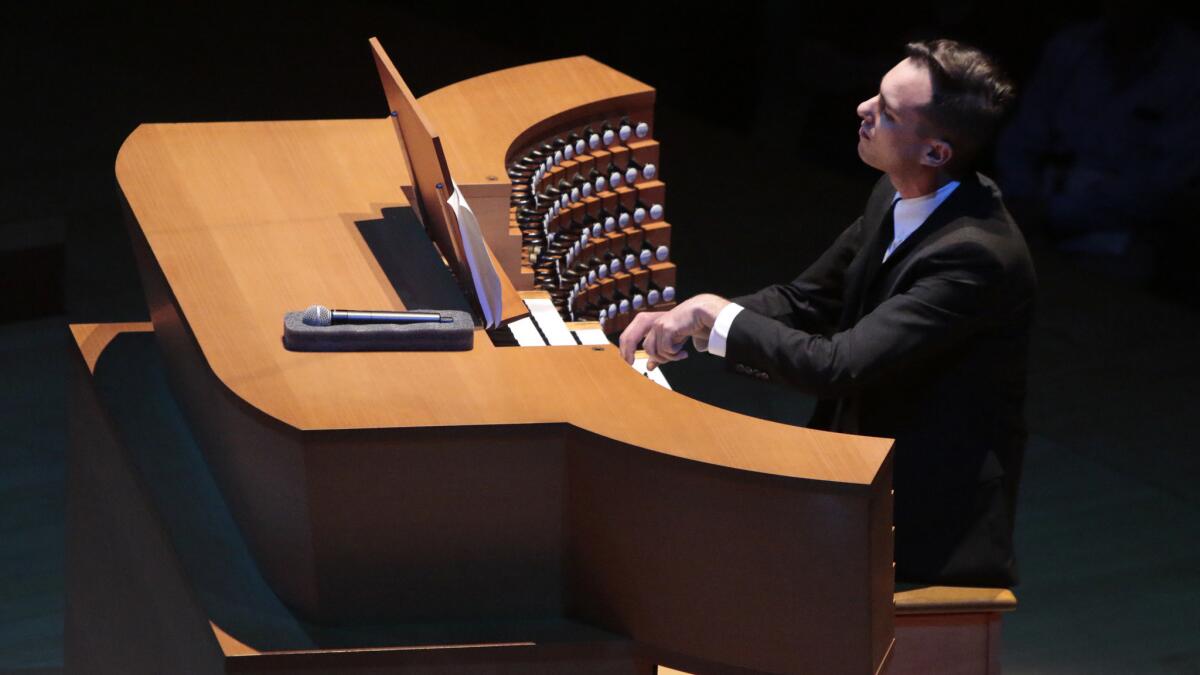L.A. Philharmonic’s organ series opener a celebration of firsts

- Share via
The Happy Birthday Hurricane Mama revels officially begin later this month with the Los Angeles Philharmonic celebrations of the 10th anniversary of the Walt Disney Concert Hall organ. There will be organ and orchestra concerts conducted by Esa-Pekka Salonen and Gustavo Dudamel as well as a birthday blowout recital featuring nine major organists.
But Hurricane Mama, as composer Terry Riley named it, actually first bellowed in concert Oct. 7, 2005, and the opening concert of the L.A. Phil’s organ series Sunday was a proper herald of things to come. There were many firsts.
It was the Disney Hall debut of the young American organist Christopher Houlihan, who turned 27 last week (the day before Hurricane Mama turned 10). His recital confirmed the impressions from previous appearances at the Cathedral of Our Lady of the Angels that Houlihan is the next big organ talent. He was joined by the L.A. Phil brass section and the orchestra’s principal timpanist Joseph Pereira, making this the first concert in Disney Hall for that irresistibly spectacular combination of organ and brass.
The program was varied, ranging from selections from Giovanni Gabrieli’s early 17th century Sacred Symphonies for brass and organ to Edward Miller’s “Pluto: The Last Planet,” written in 1992. Miller, who teaches at Cal State Fullerton, was on hand, and that leads to what must be another first here or anywhere else.
In the first two weeks of its new season, the L.A. Phil has presented five different concert programs — a gala and two subscription programs conducted by Dudamel, along with a Green Umbrella new music concert and this organ recital — and each included at least one work by a living American composer, with the composer present.
There was more to celebrate, namely the L.A. Phil’s brass section, which has begun the season with a new degree of glory, especially in Mahler’s Fifth Symphony. Last month, principal horn Andrew Bain had been spotted playing with the Berlin Philharmonic, trying out for its principal post. He’s staying in L.A.
And yet, for all that, the evening belonged to Houlihan. The program included works for brass and organ, organ alone and brass alone. With an exception or two, the standouts were the organ pieces.
Two years ago Houlihan toured the country playing the six colossal organ symphonies by the blind French composer and Notre Dame organist Louis Vierne. Vierne’s life was one of hardship, disappointment, handicap and horror, all expressed in his murky organ music full of sickly harmonies and saturnine sonorities. The six organ symphonies, some of which last 45 minutes or more, are an acquired taste, and one I acquired for the first time hearing Houlihan’s glowing, miraculously life-affirming performances.
In Disney, Houlihan’s only Vierne solos were two movements from the Fourth Organ Symphony, the mysterious slow movement and the tumultuous Finale, with everything sumptuously detailed.
Houlihan’s other major solos were a sprightly Toccata by the 20th century American composer Leo Sowerby and a splendidly colored performance of Bach’s Toccata and Fugue in C Minor.
The pieces for brass and organ were, however, mostly problematic, as were those for brass alone. The exception was a rare and fascinatingly majestic performance of Vierne’s “Marche Triomphale,” a somber, compelling extravaganza for organ, three trumpets, three trombones and timpani, written in 1921 to commemorate the centenary of Napoleon Bonaparte’s death.
The brass players stood on the second of the risers, which did not seem to be an acoustically ideal spot for them, and there were balance problems. The organ had a crispness of tone, whereas the ensembles blended into a kind of bland brass margarine for Samuel Barber’s “Mutations from Bach” and Paul Dukas’ great Fanfare. The playing wasn’t the problem, but the lack of a conductor who could shape the ensemble’s sound and phrasing was.
Miller’s “Pluto” for brass quintet and organ was the other, this time lively, exception. It plays with Holst’s “Planets,” which had been written in 1916 before Pluto was discovered.
Since Miller’s piece was written, astronomers have demoted Pluto, and now everything is just right. Being an entertaining fillip on the Holst’s planetary themes with a hint of “Star Wars,” Miller’s entertaining “Pluto” is a suitable complement for what has come to be called a “dwarf planet,” a still formidable but not imposing stellar object.
The enthusiastic audience included 80 brass students from YOLA (Youth Orchestra of Los Angeles), and the Richard Strauss Vienna Fanfare encore was for them, L.A. Phil principal trumpet Thomas Hooten said. Houlihan’s solo encore was the Scherzo from Vierne’s Second Organ Symphony, and it was, as Vierne seldom is in the hands of other organists, seductive.
Twitter: @markswed
More to Read
The biggest entertainment stories
Get our big stories about Hollywood, film, television, music, arts, culture and more right in your inbox as soon as they publish.
You may occasionally receive promotional content from the Los Angeles Times.











